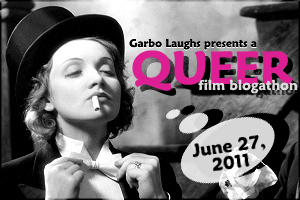My first impresion of Terrence Malick's much lauded The Tree of Life (2011)? Jessica Chastain has a rawboned Northern European face that seems specifically sculpted for photography, though not in the manner of a model so much as in the manner of a landscape. Her face reminds me of those austere, careworn faces one sees in Bergman movies. She's Malick's version of Liv Ullmann or Bibi Anderssen. She's an actress whose face seems to reflect the light and cares of the world when you point a camera at her.
My second impression: "This is utterly banal." Maybe it's because I've been seeing a gajillion earnest festival films the last two years, but the trope of a family dealing with the loss of a child, and how it resonates throughout their lives, is one of those stories that arty filmmakers reliably fall back on when they think they have something deep about the meaning of life to impart. This is the story upon which Malick hangs his version of The Book of Job. "Why did this happen?" The film's mother and son ask. The movie's answer is the answer Jehovah gives Job: "Where were you when I laid the earth's foundation... while the morning stars sang together and all the sons of God shouted for joy?" The movie doesn't elide this. It's right up front as an epigram to start the movie. Then it goes about the business of expressing this in the most literal of ways, with a creation sequence in which the universe forms, stars coalesce, planets form, and life emerges.* It's a film of great beauty. I won't deny that. But it's literal. The movie actually engages in more subtle things after it creates the universe--it equates Brad Pitt's father figure to an uncaring god, with his son, Jack O'Brien (get it?) suffering long under his heel. But that's as subtle as the movie gets. Other times, it puts it all on the table, as in this shot when Mrs. O'Brien points to the sky and tells her son "That's where god lives:"

My third impression: this isn't a story, it's a devotional. The Tree of Life articulates its theme early. There are two ways to live your life, it proposes: the way of nature, all red of fang and claw, or the way of grace, with humble submission to the whips and scorns of time and the will of god. The movie dispenses with nature and favors grace, which offers the promise of an ambiguous afterlife where you will meet everyone you ever knew again. When it arrives at this point--it's literal about the proposition that there IS an afterlife even if its exact nature isn't exactly clear--the soundtrack's incessant choral music sighs "amen." Hopefully, you haven't missed the point if you've made it this far, but if you have, the movie helpfully provides you with a musical cue.
There's an inherent danger in projecting the specific to the universal rather than the other way around. This is a conceit in which The Tree of Life indulges when it projects the mundane life of the O'Brien family in 1960s Texas up through the birth of the cosmos and into the afterlife. It suggests, to its detriment, that it is presenting a universal experience of life. Further, it suggests its viewpoint as normative when it surrounds the O'Briens by other families who are recognizably the same. I have no doubt that there are plenty of families out there like the O'Briens, or that Malick's own experience of "family" is in line with this, but it's not my experience of family, either as a child or as an adult. It irks me a little that the O'Briens are this film's version of Everyman, though as I work this out in my head as I write this I think maybe it's appropriate, given that this film is a 21st Century version of that sturdy medieval morality play. It's certainly drawn with the same broad symbolic brush. Unfortunately, there's nothing like a commonality of experience in the world anymore, and as hard as this tries for some kind of universal transcendence, it never manages to connect the dots to anyone beyond its narrow and specific lens. Or, at the very least, it doesn't connect the dots to me.
And it's SO self-important. It's SO somber. This is a film without any sense of humor or any sense of play, which is odd given that this is a film that places a huge premium on childhood and the play of children. The editing scheme that jumps from gliding shot to gliding shot with blank-faced jump cuts is a virtuoso performance, but it's virtuosity for its own sake and it's kind of cold. There's an aura of reverence, for want of a better word, that the movie sledgehammers home with its incessant chorale soundtrack and its portentous whispers and its hour-before-twilight light. This is not a movie that wants to engage your intellect; it's a film that wants to awe you into reverence.
This movie is the cinematic equivalent of a cathedral (complete with choirs and stained glass). The individual parts of most cathedrals are lovingly crafted, and when they're assembled into a greater whole, the results are often spectacular. Don't get me wrong: Chartres is one of the glories of human endeavour, as is the Hagia Sophia. The Tree of Life is a glory of cinematic light. But that's only half the story. Cathedrals are built with a specific purpose and they provide a house for a worldview and an ideology. The Tree of Life is a film for people who share its belief system, and, well, I don't. I think it's too dismissive of nature--of existence--which is really the only reality for which we have any evidence provided by our senses, while it provides a notion of grace that is built on the devout wish that everything we lose in this life will be restored after death. If you believe this, you'll have an entry point to this film. If you don't, if you think as I do that what it's offering is wishful thinking, that what it's offering is, in fact, bullshit, well, hell, it sure is pretty.
*The creation sequence in The Tree of Life seems like an upscale version of "The Rite of Spring" segment of Fantasia, though without that film's willingness to terrify. The Tree of Life also reminds me of The Coen's A Serious Man, which also retells The Book of Job in mid-century middle-class America, though with a good deal more irreverence and ambiguity. That film's injunction to "embrace the mystery" has its tongue deeply embedded in its cheek.
















1 comment:
Wow, we have very different interpretations. But I enjoyed your review, thanks.
You gotta remember who's telling the story and how he remembers it... Or what do you remember from your childhood? Blank spots can be filled with imagination and heard stories from your parents: perfectly clean delivery of the baby... Some memories are too painful to recall: absence of the dead brother from most scenes.
You say there wasn't any humor in it and you picked one of the funniest images of the whole film to your review! :D
"That's where God lives!"
You have no objection? Way of grace is like a sunflower of grace that squirts water in your face (the clown scene from the film).
I agree that the film is self-important for sure: "Where were you when I laid the earth's foundation.."
Followed by FICTIONARY DREAM (=movie) with fictionary creation sequence in it BY MALICK.
And what did they sing about in the creation sequence?
Lacrimosa:
This day full of tears
when from the ashes arises
guilty man, to be judged:
Lord, have mercy upon him.
Gentle Lord Jesus,
grant them rest.
Amen.
I didn't realize last beach as heaven or afterlife. It was more like an enlightenment or a realization of permanent change.
Cicero:
"To study philosophy is to learn to die."
He visited shore of eternal recurrence... Alone.
Post a Comment